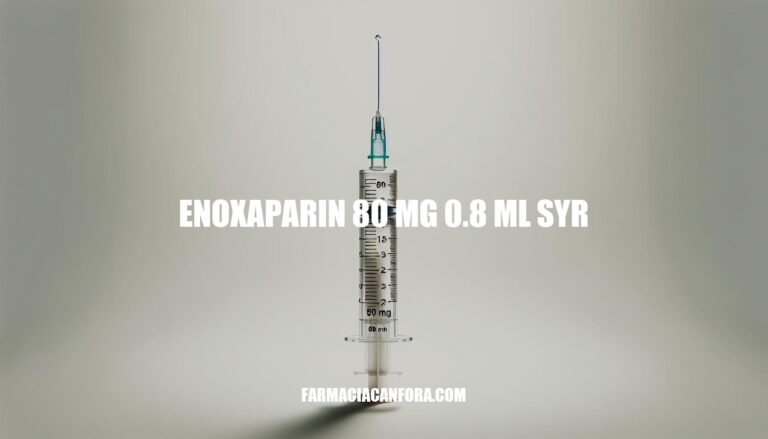Enoxaparin 80 mg/0.8 mL syringe is an anticoagulant, commonly known as a “blood thinner.” It is primarily used to prevent and treat harmful blood clots, such as deep vein thrombosis (DVT) and pulmonary embolism (PE). This medication is crucial in reducing the risk of stroke and heart attack by ensuring smooth blood flow and preventing clot formation.
Mechanism of Action
Enoxaparin, a low molecular weight heparin (LMWH), works by inhibiting two key factors in the blood clotting process: Factor Xa and Factor IIa (thrombin). By blocking these factors, enoxaparin reduces the formation of fibrin, a protein essential for blood clot formation. This action helps prevent the development of harmful blood clots, such as deep vein thrombosis (DVT) and pulmonary embolism (PE).
Indications
Enoxaparin 80 mg/0.8 ml syringe is prescribed for:
- Deep vein thrombosis (DVT)
- Pulmonary embolism (PE)
- Prophylaxis of DVT in abdominal surgery
- Prophylaxis of DVT in hip replacement surgery
- Prophylaxis of DVT in knee replacement surgery
- Prophylaxis of DVT in medical patients with severely restricted mobility during acute illness
- Unstable angina
- Non-ST elevation myocardial infarction (NSTEMI)
- ST elevation myocardial infarction (STEMI)
Dosage and Administration
Dosage and Administration for Enoxaparin 80 mg/0.8 ml Syringe:
- Dosage: Typically, enoxaparin is administered subcutaneously (under the skin) once or twice daily, depending on the condition being treated.
- Injection Site: Inject into the abdomen, at least 2 inches away from the belly button. Avoid injecting into muscles.
- Technique: Pinch the skin gently and insert the needle at a 90-degree angle. Do not rub the injection site after administration.
Always follow your healthcare provider’s specific instructions.
Side Effects
Common side effects of enoxaparin 80 mg/0.8 ml include:
- Nausea
- Diarrhea
- Anemia
- Pain, bruising, redness, or irritation at the injection site.
Serious side effects to watch for:
- Unusual or prolonged bleeding
- Severe headache
- Confusion
- Vision changes
- Dizziness or fainting
- Severe allergic reactions (rash, itching, swelling, trouble breathing).
Monitoring for adverse reactions is crucial. Report any unusual symptoms to your healthcare provider immediately to ensure timely intervention and prevent complications.
Precautions and Contraindications
Here are the precautions and contraindications for using enoxaparin 80 mg/0.8 ml syringe:
Precautions
- Medical History: Inform your doctor if you have a history of kidney or liver disease, bleeding disorders, low platelet counts, high blood pressure, recent surgeries (especially eye, brain, or spinal cord), or spinal deformities.
- Alcohol: Limit alcohol intake while using this medication.
- NSAIDs: Avoid using NSAIDs (e.g., ibuprofen) without doctor approval due to increased risk of stomach bleeding.
- Pregnancy and Lactation: Consult your doctor before use.
Contraindications
- Active Major Bleeding
- History of Heparin-Induced Thrombocytopenia (HIT) within the past 100 days or in the presence of circulating antibodies
- Hypersensitivity to enoxaparin, heparin, pork products, or benzyl alcohol (for multiple-dose formulations)
Potential Drug Interactions
- Aspirin: Do not take without doctor approval.
- Mifepristone: Avoid using this drug.
- Other Anticoagulants: Increased risk of bleeding.
If you have any specific concerns or conditions, it’s always best to discuss them with your healthcare provider.
Enoxaparin 80 mg/0.8 mL Syringe: An Anticoagulant for Preventing and Treating Blood Clots
Enoxaparin 80 mg/0.8 mL syringe is an anticoagulant used to prevent and treat harmful blood clots, such as deep vein thrombosis (DVT) and pulmonary embolism (PE). It works by inhibiting factors in the blood clotting process, reducing the formation of fibrin and preventing clot formation.
Prescribed Conditions and Administration
Enoxaparin is prescribed for various conditions, including:
- DVT (Deep Vein Thrombosis)
- PE (Pulmonary Embolism)
- Unstable Angina
- NSTEMI (Non-ST Elevation Myocardial Infarction)
- STEMI (ST Elevation Myocardial Infarction)
It is administered subcutaneously once or twice daily, depending on the condition being treated.
Common and Serious Side Effects
Common side effects include:
- Nausea
- Diarrhea
- Anemia
- Pain at the injection site
Serious side effects to watch for include:
- Unusual bleeding
- Severe headache
- Confusion
- Vision changes
- Dizziness
- Severe allergic reactions
Precautions and Contraindications
Precautions include:
- Informing your doctor of a history of kidney or liver disease
- Bleeding disorders
- Low platelet counts
- High blood pressure
- Recent surgeries
- Spinal deformities
Contraindications include:
- Active major bleeding
- Heparin-induced thrombocytopenia (HIT)
- Hypersensitivity to enoxaparin or heparin
- Pregnancy or lactation without doctor approval
Drug Interactions
Potential drug interactions include:
- Aspirin
- Mifepristone
- Other anticoagulants


